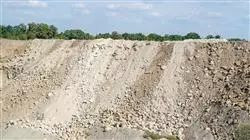University certificate
The world's largest faculty of engineering”
Introduction to the Program
Geotechnical projects are on the rise, and acquiring the competencies to operate successfully in this sector is a highly disruptive skill in an ever-growing industry"

The Postgraduate diploma in Geotechnical Behavior of Slopes and their Applications is academically designed to provide in-depth knowledge, based on advanced concepts already acquired in the world of civil engineering and from a practical application point of view, of the most important geotechnical aspects that can be found in different types of civil works.
The content ranges from the specific behavior of soils and rocks, with a constant differentiation of both types of terrain throughout all the topics, to their direct application in foundations and structures.
The Postgraduate diploma, has a syllabus that mixes some of them with more applied theoretical load (such as those related to the models of ground behavior, the necessary requirements for a good identification of soils and rocks or the interaction of the ground with seismic disturbances), with others with eminent component of practical analysis, where the knowledge acquired on the behavior of the ground and its stress-strain states of this first part, are applied to the usual structures of Geotechnical Engineering: slopes, walls, walls, screens, tunnels, etc.
Geotechnical engineering and its application in foundations and structures is present in many civil engineering projects and works. This path, which goes from compaction and seismic considerations in linear works to the execution of tunnels and galleries, is the one that is carried out with the case studies addressed in each of the Postgraduate diploma subjects. It is a priority that these case studies are current and relevant. This allows for an original and application-oriented analysis of the theoretical concepts developed throughout the course.
Therefore, the Postgraduate diploma in Geotechnical Behavior of Slopes and their Applications integrates the most complete and innovative educational program in the current market in terms of knowledge and latest available technologies, as well as encompassing all the sectors or parties involved in this field. In addition, the Postgraduate diploma consists of exercises based on real cases of situations currently managed or previously faced by the teaching team.
All this, along a 100% online training that provides the student with the ease of being able to take it wherever and whenever they want. All you need is a device with internet access, and you will be able to access a universe of knowledge that will be the main asset of the engineer when positioning themselves in a sector that is increasingly in demand by companies in various sectors.
Apply the latest advances in soil and rock foundations and become a successful engineer"
The Postgraduate diploma in Geotechnical Behavior of Slopes and their Applications contains the scientific most complete and up-to-date educational program on the market. The most important features of the program include:
- Practical cases presented by experts in Civil Engineering and Geotechnics
- The graphic, schematic, and eminently practical contents with which they are created provide scientific and practical information on the disciplines that are essential for professional practice
- Practical exercises where the self-assessment process can be carried out to improve learning
- Special emphasis on innovative methodologies
- Theoretical lessons, questions to the expert, debate forums on controversial topics, and individual reflection assignments
- Content that is accessible from any fixed or portable device with an Internet connection
You will be provided with innovative teaching materials and resources that will facilitate the learning process and the retention of the contents learned for a longer period of time"
The program’s teaching staff includes professionals from the sector who contribute their work experience to this training program, as well as renowned specialists from leading societies and prestigious universities.
The multimedia content, developed with the latest educational technology, will provide the professional with situated and contextual learning, i.e., a simulated environment that will provide immersive training programmed to train in real situations.
This program is designed around Problem Based Learning, whereby the professional must try to solve the different professional practice situations that arise during the academic year. For this purpose, the professional will be assisted by an innovative interactive video system created by renowned and experienced engineering experts.

A 100% online training that will allow you to combine your studies with the rest of your daily activities"
Why study at TECH?
TECH is the world’s largest online university. With an impressive catalog of more than 14,000 university programs available in 11 languages, it is positioned as a leader in employability, with a 99% job placement rate. In addition, it relies on an enormous faculty of more than 6,000 professors of the highest international renown.

Study at the world's largest online university and guarantee your professional success. The future starts at TECH”
The world’s best online university according to FORBES
The prestigious Forbes magazine, specialized in business and finance, has highlighted TECH as “the world's best online university” This is what they have recently stated in an article in their digital edition in which they echo the success story of this institution, “thanks to the academic offer it provides, the selection of its teaching staff, and an innovative learning method aimed at educating the professionals of the future”
A revolutionary study method, a cutting-edge faculty and a practical focus: the key to TECH's success.
The most complete study plans on the university scene
TECH offers the most complete study plans on the university scene, with syllabuses that cover fundamental concepts and, at the same time, the main scientific advances in their specific scientific areas. In addition, these programs are continuously being updated to guarantee students the academic vanguard and the most in-demand professional skills. In this way, the university's qualifications provide its graduates with a significant advantage to propel their careers to success.
TECH offers the most comprehensive and intensive study plans on the current university scene.
A world-class teaching staff
TECH's teaching staff is made up of more than 6,000 professors with the highest international recognition. Professors, researchers and top executives of multinational companies, including Isaiah Covington, performance coach of the Boston Celtics; Magda Romanska, principal investigator at Harvard MetaLAB; Ignacio Wistumba, chairman of the department of translational molecular pathology at MD Anderson Cancer Center; and D.W. Pine, creative director of TIME magazine, among others.
Internationally renowned experts, specialized in different branches of Health, Technology, Communication and Business, form part of the TECH faculty.
A unique learning method
TECH is the first university to use Relearning in all its programs. It is the best online learning methodology, accredited with international teaching quality certifications, provided by prestigious educational agencies. In addition, this disruptive educational model is complemented with the “Case Method”, thereby setting up a unique online teaching strategy. Innovative teaching resources are also implemented, including detailed videos, infographics and interactive summaries.
TECH combines Relearning and the Case Method in all its university programs to guarantee excellent theoretical and practical learning, studying whenever and wherever you want.
The world's largest online university
TECH is the world’s largest online university. We are the largest educational institution, with the best and widest online educational catalog, one hundred percent online and covering the vast majority of areas of knowledge. We offer a large selection of our own degrees and accredited online undergraduate and postgraduate degrees. In total, more than 14,000 university degrees, in eleven different languages, make us the largest educational largest in the world.
TECH has the world's most extensive catalog of academic and official programs, available in more than 11 languages.
Google Premier Partner
The American technology giant has awarded TECH the Google Google Premier Partner badge. This award, which is only available to 3% of the world's companies, highlights the efficient, flexible and tailored experience that this university provides to students. The recognition as a Google Premier Partner not only accredits the maximum rigor, performance and investment in TECH's digital infrastructures, but also places this university as one of the world's leading technology companies.
Google has positioned TECH in the top 3% of the world's most important technology companies by awarding it its Google Premier Partner badge.
The official online university of the NBA
TECH is the official online university of the NBA. Thanks to our agreement with the biggest league in basketball, we offer our students exclusive university programs, as well as a wide variety of educational resources focused on the business of the league and other areas of the sports industry. Each program is made up of a uniquely designed syllabus and features exceptional guest hosts: professionals with a distinguished sports background who will offer their expertise on the most relevant topics.
TECH has been selected by the NBA, the world's top basketball league, as its official online university.
The top-rated university by its students
Students have positioned TECH as the world's top-rated university on the main review websites, with a highest rating of 4.9 out of 5, obtained from more than 1,000 reviews. These results consolidate TECH as the benchmark university institution at an international level, reflecting the excellence and positive impact of its educational model.” reflecting the excellence and positive impact of its educational model.”
TECH is the world’s top-rated university by its students.
Leaders in employability
TECH has managed to become the leading university in employability. 99% of its students obtain jobs in the academic field they have studied, within one year of completing any of the university's programs. A similar number achieve immediate career enhancement. All this thanks to a study methodology that bases its effectiveness on the acquisition of practical skills, which are absolutely necessary for professional development.
99% of TECH graduates find a job within a year of completing their studies.
Postgraduate Diploma in Geotechnical Behavior of Slopes and their Applications
.
Slopes are fundamental geotechnical structures in civil engineering and geotechnical projects. Understanding their behavior and applying the appropriate techniques is essential to ensure the stability and safety of the works. At TECH Global University, we offer you the Postgraduate Diploma program in Geotechnical Behavior of Slopes and its Applications, a unique opportunity to acquire the necessary knowledge in this specialty.
Extensive training program in Geotechnical Slope Behavior and its Applications, a unique opportunity to acquire the necessary knowledge in this specialty.
Extensive training program in Geotechnical Slope Behavior and its Applications, a unique opportunity to acquire the necessary knowledge in this specialty.
Enroll now and start advancing in your professional path
.
This program is taught in online mode, which allows you to access the educational content from anywhere and adapt your studies to your pace and schedule. At TECH Global University, we stand out for offering quality academic programs with a practical approach and oriented to the needs of the labor market. In the Postgraduate Diploma in Geotechnical Behavior of Slopes and its Applications, you will explore in depth the theoretical and practical principles related to the geotechnical behavior of slopes. You will learn about the different types of slopes, the geological and geotechnical conditions that influence their stability and the most advanced analysis and design techniques. Our team of expert professors will guide you through real cases and field studies, providing you with the necessary tools to evaluate slope stability, prevent risks and apply appropriate solutions in geotechnical engineering projects. You will also become familiar with specialized software used in slope analysis and will be able to put your knowledge into practice in online simulation environments. At the end of the program, you will be prepared to face the challenges of the geotechnical field and contribute to the safe and sustainable development of infrastructure projects. Earn your Postgraduate Diploma in Geotechnical Slope Behavior and Applications certificate from TECH Global University and expand your career opportunities in the field of geotechnical engineering.







